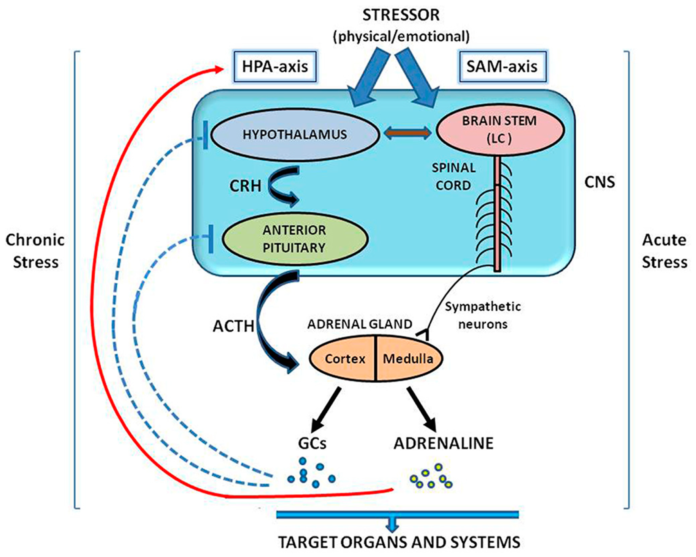
The Link Between Chronic Stress and Increased Risk of Colon Cancer
Stress has become a common part of our lives, and it can manifest in various ways – be it from work, relationships, finances, or any other life challenges. While we often associate stress with mental health issues, recent studies have shown that chronic stress can have a significant impact on our physical health, particularly in relation to the development of certain types of cancer. One such cancer that has been found to be linked to chronic stress is colon cancer. In this article, we will explore the connection between chronic stress and an increased risk of colon cancer, as well as delve into the factors that contribute to this link.
Understanding Colon Cancer
Colon cancer, also known as colorectal cancer, develops in the large intestine (colon) or rectum. It typically starts as small, noncancerous clusters of cells called polyps, which, over time, can become cancerous. Colon cancer is one of the most prevalent types of cancer, affecting both men and women worldwide. Risk factors for colon cancer include age, family history, personal history of certain conditions such as inflammatory bowel disease, and lifestyle factors such as smoking, alcohol consumption, physical inactivity, and poor diet.
The Role of Chronic Stress
Chronic stress occurs when an individual consistently experiences stress over an extended period. This type of ongoing stress can lead to a range of physical and psychological health problems. Studies exploring the link between chronic stress and colon cancer have revealed that stress can alter the function and composition of the gut microbiota, the complex community of microorganisms that inhabit our digestive system. Stress disrupts the balance of these microorganisms, leading to an overgrowth of harmful bacteria and a decrease in beneficial bacteria. This dysbiosis within the gut microbiota can contribute to inflammation and an increased risk of colon cancer.
Furthermore, chronic stress triggers the release of stress hormones, such as cortisol, which can have detrimental effects on the body. Excessive cortisol levels have been associated with inflammation and the suppression of the immune system. Inflammation plays a crucial role in the initiation and progression of cancer, including cancer of the colon. Additionally, chronic stress can impair the immune system’s ability to identify and destroy cancer cells, further contributing to the increased risk of colon cancer.
Factors Contributing to the Link
While it is clear that chronic stress can increase the risk of colon cancer, it is essential to understand the factors that contribute to this link. Firstly, individuals under chronic stress often adopt unhealthy coping mechanisms, such as cigarette smoking, excessive alcohol consumption, or unhealthy eating habits like choosing high-fat foods. These behaviors are known risk factors for colon cancer and can exacerbate the negative effects of chronic stress on the body.
Moreover, chronic stress leads to a variety of physiological changes, including increased levels of cortisol and other stress hormones. These hormonal imbalances can disrupt important metabolic pathways in the body, compromising immunity, promoting inflammation, and disrupting the normal regulatory processes involved in the prevention of cancer development.
Frequently Asked Questions (FAQs):
Q: Can stress management techniques reduce the risk of colon cancer?
A: While stress management techniques may not directly reduce the risk of colon cancer, they can still be beneficial for overall well-being. Engaging in activities such as exercise, meditation, or therapy can help individuals cope with stress and potentially reduce the harmful effects it has on the body. However, it is crucial to address other risk factors and make lifestyle changes to further decrease the risk of colon cancer.
Q: Are there any specific stress-related behaviors that increase the risk of colon cancer?
A: Yes, certain stress-related behaviors can increase the risk of colon cancer. These include smoking, excessive alcohol consumption, overeating unhealthy foods, and leading a sedentary lifestyle. These behaviors should be avoided or minimized to decrease the risk of colon cancer.
Q: Can stress directly cause colon cancer?
A: While chronic stress has been linked to an increased risk of colon cancer, it is essential to understand that stress alone does not directly cause cancer. Rather, it contributes to the risk by promoting chronic inflammation, compromising the immune system, and leading to unhealthy lifestyle choices that can increase the likelihood of developing colon cancer.
In conclusion, chronic stress has been found to have a significant impact on increasing the risk of colon cancer. The disruption of gut microbiota, the release of stress hormones, and the adoption of unhealthy coping mechanisms all contribute to this link. While stress management techniques can help individuals better cope with stress, it is crucial to address other risk factors and make healthy lifestyle choices to reduce the overall risk of colon cancer.

















